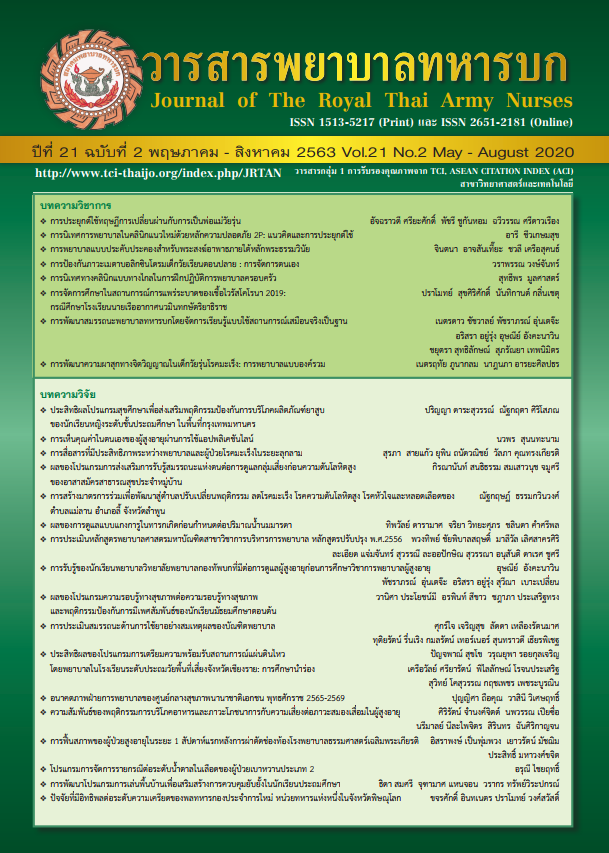Effectiveness of Health Education Program for a Promoting Preventive Behavior of Tobacco Product Consumption Among Primary School Female Students in Bangkok Metropolitan
Keywords:
Health Education Program, Preventive Behavior of Tobacco Product ConsumptionAbstract
quasi-experimental study aimed to examine the effectiveness of a health education program for a promoting preventive behavior of tobacco product consumption among primary school female students in Bangkok Metropolitan Based on the theory of planned behavior. The sample was grade 5 students with risk behavior of tobacco product consumption. From two primary schools in Bangkok Metropolitan, Thailand. Participants were selected by simple random sampling to either the experimental group (n = 30) and the compared group (n = 30). The experimental group participated in a health education program for promoting preventive behavior of tobacco product consumption using child-centered with various activities for 5 weeks. The compare group participated in a regular health education class. The instrument in data collection was a questionnaire. Data was analyzed by using Descriptive statistics, dependent t-test, and independent t-test.
The result revealed that at post study, perceived attitude toward not - tobacco product consumption, perceived subjective norm to not - tobacco product consumption, perceived behaviors control for not - tobacco product consumption and intention to not - tobacco product consumption in the experimental group showed a greater mean score than the pre-test mean score at .05 significant level. At post-test, only perceived attitude toward not - tobacco product consumption and intention to not - tobacco product consumption mean score in the experimental group was found greater than the comparison group at
.05 significant level
Downloads
References
Menglu Y, Sarah J, Sandra E and Frances M. Nicotine and the adolescent brain. J Physiol. 2015 Aug 15; 593 (Pt 16): 3397–3412.
U.S. National Cancer Institute and World Health Organization. The Economics of Tobacco and Tobacco Control. National Cancer Institute Tobacco Control Monograph 21, 2016.
World Health Organization. WHO report on the global tobacco epidemic. 2017
Regional Office for South-East Asia, World Health Organization. Global youth tobacco survey: Thailand. 2015.
Academic Development Group, Bureau of Tobacco Control. Situation of Tobacco Use in Students on Age 15-18 years in Thailand Report 2018. Nonthaburi: Bureau of Tobacco Control; 2018. (in Thai)
Vathesatogkit P, Jiratananon S and Seeranon S. To know Tobacco industry. Bangkok: Action on Smoking and Health Foundation Thailand; 2013. (in Thai)
Reangsing C. Caring for Smoking Adolescents: A Challenging Role for Nurses. Journal of the Royal Thai Army Nurses 2013; 14:17-24. (in Thai) 8. Friedman MM. Family nursing: Research, Theory & Practice. 4th ed. Stamford: Appleton & Lamge; 1998.
W. Jirathanapiwat et al. Hijacking ‘Sustainability’ from the SDGs: Review of Tobacco Related CSR activities in the ASEAN Region, Southeast Asia Tobacco Control Alliance (SEATCA), Bangkok. Thailand. 2017
Gerry F and Joseph W. Factors that influence adolescent reports of counseling by physicians on risky behavior. Journal of Adolescent Health 2005; 37(6): 467-476.
Dusek JB. Adolescent development and behavior. 3rd ed. New Jersey: Prentice-Hall;1996.
Fairbrother G, Scheinmann R, Osthimer B, Dutton MJ, Newell KA, Fuld J and et al. Factors that influence adolescent reports of counseling by physicians on risky behavior. J Adolesc Health. 2005 Dec;37(6):467-76.
Ajzen I. The attitude, personality and behavior. 2nd ed. Milton –Keynes: Open University Press–Mc Graw Hill Education; 2005.
Antharabutr J. Effect of Health Education Program for smoking prevention behavior among Adolescent based on the theory of planned behavior [dissertation]. Bangkok: Mahidol University; 2013. 188 page (in Thai)
Sompayom S. and Wattanaburanon A. Professional Health Instruction. Bangkok: Dokya Printing; 1980. (in Thai)
Cotakut S. Psychology of learning. 9th ed. Bangkok: Chulalongkorn University Printing; 2013. (in Thai)
Kaewsutha N, Auncheun P, Somsuay P and Weerakul N. The Effect of positive tobacco refusal program in dental school program of primary school students, Bangkok. Journal of Humanities and Social Sciences 2017; 9:53-68. (in Thai)
kaewmanee M, Promaruk T, and Jutasak J. Effectiveness prevention smoking program by application to theory of motivation in the change of behaviors in lower secondary students in Atsamat district, Roi-Et province. Journal of Sakon Nakhon Hospital 2014;17(3): 77-86. (in Thai)
Suvamat J. The Effect of a smoking prevention program for early male adolescent in foster home. Thai Journal of Nursing 2015; 64:1-11. (in Thai)
Chomekhunthod S, Homsin P and Srisuriyawet R. Effects Of Self- Efficacy Enhancement And Family Participation On Smoking Refusal Self- Efficacy And Intention To Not Smoking Of Male Primary School Students. The Public Health Journal of Burapha University 2014; 9:91-103. (in Thai)
Intarakamhang U. The Effect of 3-Self-Health Behavior Modification Program by PROMISE Model. Bangkok: Sukhumvit printing; 2009. (in Thai)
Sunopat S, Promaruk T and Sookaneknun P. Effects of the Program for Protection the New Smokers among Secondary School Students in Roi-Et Municipal, Roi-Et Province. The office of disease prevention and control 9th Nakhon Ratchasima 2018; 24:86-95. (in Thai)
Poomsanguan K. Building Health Skills to Result in Life Skills: Challenges of Teaching Health Education in Thai Youth. Journal of the Royal Thai Army Nurses 2014;15: 60–5. (in Thai)
Sarayuthpitak J. Educational Health Education Methodology, Health and Physical Education Program Department of Educational Technology and Communication, Faculty of Education, Chulalongkorn University. Bangkok: Faculty of Education; 2011. (in Thai)
Downloads
Published
How to Cite
Issue
Section
License
บทความหรือข้อคิดเห็นใดใดที่ปรากฏในวารสารพยาบาลทหารบกเป็นวรรณกรรมของผู้เขียน ซึ่งบรรณาธิการหรือสมาคมพยาบาลทหารบก ไม่จำเป็นต้องเห็นด้วย
บทความที่ได้รับการตีพิมพ์เป็นลิขสิทธิ์ของวารสารพยาบาลทหารบก
The ideas and opinions expressed in the Journal of The Royal Thai Army Nurses are those of the authors and not necessarily those
of the editor or Royal Thai Army Nurses Association.






